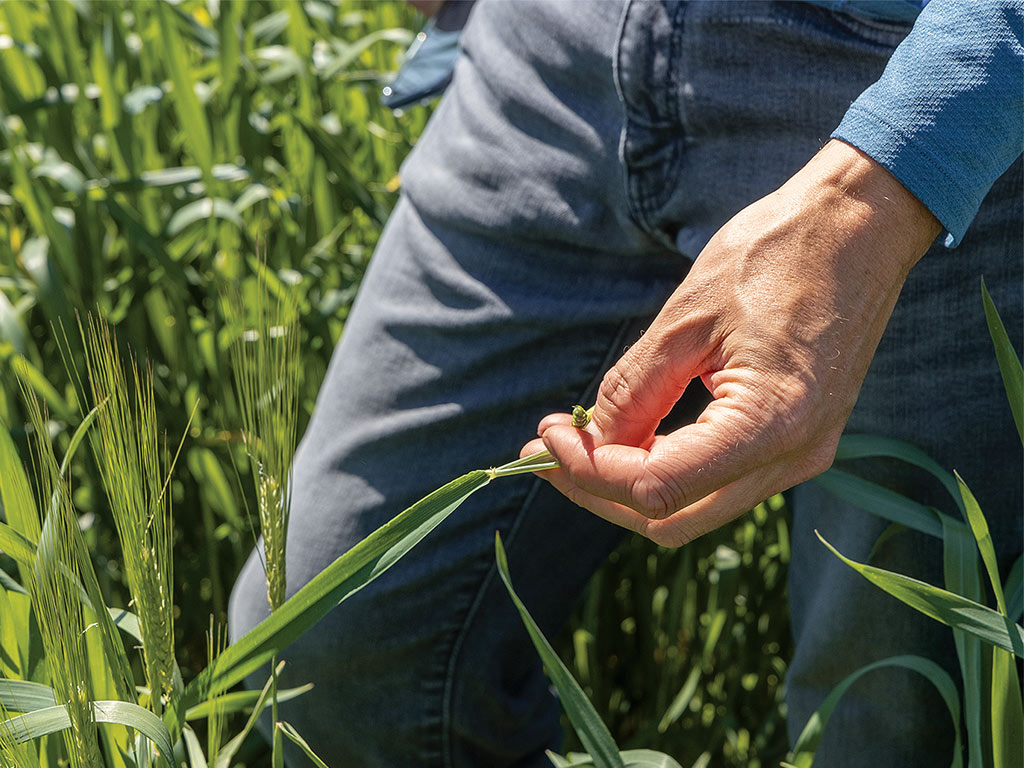Agriculture, Farm Operation April 01, 2025
More Eyes the Better
Hiring an agrologist can help your bottom line.
by Lorne McClinton
Crop management is not getting any simpler these days. It's easy for farmers to get overwhelmed by the sheer amount of data their combines, sprayers, planters, and tractors are collecting. Nutrient management is getting more complex, herbicide-tolerant weeds are becoming a bigger problem every year, and land is now so valuable it's important to maximize profits on every acre. But with all the fine detailed information at your fingertips it's easy to lose sight of the forest for the trees. That's why despite profit margins being tighter than they have been for years, many producers prefer to contract their data crunching, scouting, and other agronomy services to professionals.
"I'd say the major reason that people have started hiring private agronomy consultants is the complexity of the number of products available on the market today," says Jonathan Zettler with Fieldwalker Agronomy of Clifford, Ontario. "There are a lot of decisions that can be made and making the best one means you need to spend more time out in the field to stay on top of what's going on. Certainly, some can do this in-house, but many struggle to find the time for it. And as farm operations move from thousands to millions of dollars of revenue there is just less room for errors, you need to get it right."
In winter 2023/2024 Zettler ran a survey to gather information on what his customers really valued. Their feedback told him they wanted him to benchmark where their operation stands, identify any gaps that need to be improved, and then put together a plan on how to do it. It dovetailed nearly perfectly with his goal when he established his business.
Zettler founded his company in 2018 to provide farmers with actionable agronomy to enable them to increase their profitability. He breaks these down by what he describes as 10,000, 1,000, and 10-foot levels. He offers an agronomy newsletter "The Cropwalker," provides agronomy services, and produces SWAT MAPS for farmers who want a detailed soil foundation map showing where the fertility levels and pH levels are at in their fields.
A newsletter is typically about 2,000 words. In-season issues focus on what needs to happen in the coming week. Winter issues highlight information from the various winter farm conferences.
His agronomy services appeal to two different client bases. One group are producers who look to him to elevate their level of management. The other includes those kept so busy by their other enterprises, perhaps a dairy or a trucking company, that they want someone to help them stay on top of what's happening in their fields over the season. SWAT MAPS customers usually are larger cash crop operations who are interested in wanting to utilize the variable rate capabilities of their equipment to make the best use of their input dollars.
Above. Zettler says it's the complexity of modern farming, and the economic ramifications of making a mistake that has farmers turning to agronomists to help them manage their time.
Adding value. "It's hard for producers to make good decisions without having a good base data layer so a big part of my role as an agronomist today is simply to capture data," Zettler says. "Where I think we differentiate ourselves from other private agronomists is the level of advice we give on what producers should do with the data. For example, let's look at the weed spectrum you might have in a field. Typically, there are multiple ways to controlling weeds in corn, but the one you recommend needs to fit within the grower's equipment and operational capabilities and price point. If you can finesse all these, you can add considerable value to the farming operation."
Typically, Zettler soil tests every three years (after cereals) to understand the nutrient levels he is working with and what will need to be applied. Because most clients are repeat customers with fairly consistent crop rotations, he has a good base knowledge of their fields' weed spectrums and what shifts might be expected.
He's a firm believer in walking through the fields to ground truth that the crop, weeds, and disease are as expected. Usually there will be lots of changes to the fertility plan because there are always things that happen.
There are many things that need to be done in short order during the growing season. It's easy for producers to start feeling overwhelmed if the weather doesn't cooperate or there are other setbacks. So, when things get hectic, it's nice to know you have an extra set of eyes on hand to provide a sanity check. ‡
Read More

AGRICULTURE, SPECIALTY/NICHE
As Fresh as it Gets
Luxury Charlevoix hotel establishes its own farm.

AGRICULTURE, FARM OPERATION
Cereal Rye to the Rescue
The do-all cover is a defense against pigweeds.



